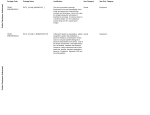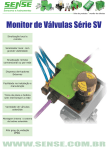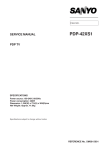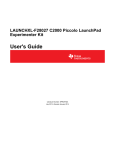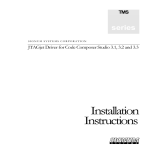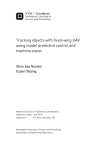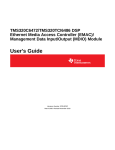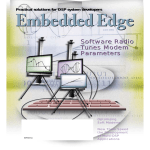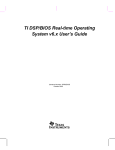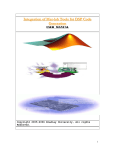Download Detail Specificatins (CoE - SIP)
Transcript
COLLEGE OF ENGINEERING, PUNE (An Autonomous Institute of Govt. of Maharashtra) Pune – 411005 INDIA. CENTER OF EXCELLENCE in SIGNAL and IMAGE PROCESSING (COE-S&IP) Dr. Mukul S. Sutaone Tel: 91-20-2550 7305 E-mail: [email protected] Web: www.coep.org.in/coesip Principal Investigator Details of Shopping Items to be purchased under CENTER OF EXCELLENCE in SIGNAL and IMAGE PROCESSING (COE-S&IP) Sr. No. 1 PMSS Package Code TEQIP-II/MH/MH2G02/77 Item Name COESIP- 2 (Workstation) Detailed Specification Operating System: Free DOS, RHEL 5.7. Processor: Intel Core (i7) Quad core CPU (3.40 GHz, 8MB cache, 4 cores.). Memory: 8GB DDR3RAM. HDD: 1TB. Memory maximum support upto: 16 GBDDR3RAM. Memory Slot: 4 DIMM. Optical drive: SATA Super Multi DVD Writer. Graphics drive: NVDIA Quadro K4000. USBs: 10 USB 2.0,1 Serial,1 PS/2Keyboard,1PS/2Mouse,1Display port,1VGA,1Microphone/Headphone Jack,1Line in,1 Line out,1RJ-45. Audio: Integrated High Definition audio with realtek 2channel ALC261 Codec(all ports are stereo). Network Interface: Integrated Intel82579LM Gigabit Ethernet. Form factor: Small form Factor. Keyboard: PS/2 Standard Keyboard. Mouse: PS/2 Optical Mouse. Monitor: 47cm (18.5”) Widescreen Flat Panel Monitor. Warranty: 3/3/3(Parts, labor, onsite) Comprehensive warranty. Sr. No. 2 PMSS Package Code TEQIP-II/MH/MH2G02/78 Item Name COESIP- 3 (Server) Detailed Specification Motherboard: IntelC600. Core configuration: 8-Core. Compatible Processor: Intel xeon E5. Graphics Processor: Matrox G200. Supported Platforms: Windows/Linux RHEL 5.7. Maximum Memory: 768GB. Standard memory: 32GB. Max.storage: 16TB. Rackmount: 2U. Supported Memory Functions: LRDIMM, RDIMM, and UDIMM. Memory slots: 24DIMM. Raid controller: HP Smart array P410i/1GBFBWC. I/O Connection: Serail1, Ethernet 4, USB2.0 7, VGA Ports 2, RJ45 Nil. Power use: 460Watts. Mouse: PS/2 Optical mouse. Monitor: 47cm (18.5") Widescreen flat monitor. Warranty: 3 Years Sr. No. 3 PMSS Package Code TEQIP-II/MH/MH2G02/80 Item Name COESIP- 5 (Printer) Detailed Specification Tasks: Print, Scan, Copy Facilities. Quantity: 5 Print speed black: Upto 18 ppm. Duty cycle: Up to 8000 pages Print Technology: Laser Print Quality back: Upto 600*600DPI Print languages: Host Based. Display: Dual digit numeric LED. Processor Speed: 400 MHz. Automatic paper sensor: No. Compatible operating system: Windows8, 7, XP, Vista, Linux. Sr. No. 4 PMSS Package Code TEQIP-II/MH/MH2G02/81 Item Name Detailed Specification COESIP- 6 (Universal Programmer) Universal Programmer- 3 Quantity Pin: 48 Pin ZIF Socket with universal pin-driver. (40 Pin zif for VP 290). Interface: Interface with laptop, PC, through USB. File format: Accepts standard file formats: JEDEC, Intel Hex, and Motorola S Record. Bit management: Manages 16 and 32 bit word split. Supporting compiler: Support most complier in JEDEC Format, including ABEL, CUPL, PALASM, TANGO, PLD, ORCAD. Designer: PLD Designer and ISDDATA. Features: Features Test vector capability and multiarray fuse map editor. Testing: Test TTL/CMOS Logic Ics and Dynamic/Static Random access memory devices. TTL/CMOS: Automatically identifies TTL/CMOS Log IC. Device: Device insertion and poor-pin contact check. Supporting Voltage devices: Support 1.5V Low voltage devices. Adapter: Universal DIP, PLCC, QFP, TSOP, PSOP, SOIC, SSOP, SDIP Adapter. Programming speed: Super programming speed programme 89C55 in Less than 6 seconds. Supporting windows: Supports windows 2000/NT/XP/Vista. Auto mode: Auto run mode starts programming. Sr. No. 5 PMSS Package Code TEQIP-II/MH/MH2G02/82 Item Name Detailed Specification COESIP- 7 (TMS 320C6748 DSP Development Kit) • TMS320C6748 DSP software and development kit to jump-start real-time signal processing innovation for biometric analytics applications, audio and more • Reduces design work with downloadable and duplicable board schematics and design files • Fast and easy development of applications requiring fingerprint recognition and face detection with embedded analytics • Low-power TMS320C6748 applications processor • Scalable platform enables a variety of performance, power, peripheral and price options • 128MByte DDR2 SDRAM • 128-MByte NAND Flash memory • Micro SD/MMC slot • USB and SD connectors • Wide variety of peripheral interfaces • Line in, headphone out, MICin ports • Expansion connectors • Includes Code Composer Studio IDE 4.0 • Full documentation on CD-ROM Technical details The C6748 development kit includes everything needed to start demonstrating applications in less than 10 minutes and to begin writing code in less than an hour. The development kit is based on the TMS320C6748, a low-power dual-core applications processor based on a fixed-point C64x+™ instruction set and the floating point C67x+™ instruction set. It provides significantly lower power than other members of the TMS320C6000™ platform of DSPs and provides both fl oating-point precision and fixed-point performance in the same device. With a wide variety of standard interfaces for connectivity and storage, the C6748 development kit enables developers to easily bring audio, video and other signals onto the board. Expansion headers allow customers to extend the functionality of the kit to include a camera sensor or an LCD screen. Included interfaces are: • USB serial port • Fast Ethernet port (10/100 Mbps) • USB host port (USB 1.1) • USB OTG port (USB 2.0) • SATA port (3 Gbps) • VGA port (15-pin D-SUB) • LCD port (Beagleboard-XM connectors) • 3 audio ports • 1 line in • 1 line out • 1 MIC in • Composite in (RCA jack) • Leopard Imaging camera sensor input (32-pin ZIP connector) [(Aptina MT9P111(SOC5140) CMOS Sensor Module LI-5M05CM-AF)] • Authentic fingerprint sensor For designs needing only DSP performance, designers can scale between the software and pin-to-pin compatible TMS320C6748/6/2 DSPs as well as other softwarecompatible TMS320C6000™ DSPs available at a variety of performance, power, peripheral and price options. Designers can also select the ideal combination of ARM and DSP performance needed for any design with the software and pin-compatible OMAPL138/2 DSP+ARM9™ processors to add high-level operating systems such as Linux™. Sr. No. 6 PMSS Package Code TEQIP-II/MH/MH2G02/83 Item Name Detailed Specification COESIP- 8 (Code Composer Studio V5) There are many features included in Code Composer Studio IDE. The following are some of the key features that may be of interest. Resource Explorer: The Resource Explorer provides quick access to common tasks such as creating new projects as well as enabling users to browse through extensive examples provided as part of ControlSUITE™, StellarisWare and others. Grace™–Peripheral Code Generation : Grace is a feature of Code Composer Studio that allows MSP430 users to generate peripheral set up code within minutes. The generated code is fully-commented and easy-to-read C-code. SYS/BIOS: SYS/BIOS is an advanced, real-time operating system for use in a wide range of digital signal processors (DSP), ARM microprocessors, and microcontrollers. It is designed for use in embedded applications that need real-time scheduling, synchronization, and instrumentation. It provides preemptive multitasking, hardware abstraction, and memory management. SYS/BIOS is royalty free and is included with Code Composer Studio. Compiler : Code Composer Studio includes C/C++ compilers tailored for TI’s embedded device architectures. Compilers for C6000™ and C5000™ digital signal processor devices get the most out of the powerful performance potential of those architectures. Compilers for TI’s ARM® and MSP430 microcontrollers, while not sacrificing performance altogether, are more attuned to the code size needs of those application domains. The compiler for TI’s real-time C2000™ microcontrollers takes the best advantage of the many performance and code size features available in this architecture. The Control Law Accelerator (CLA) C-Compiler is also supported in CCSv4 and CCSv5. For more information on the CLA C-Compiler, please click here. Support for C++ could not be any better, especially now that EABI is rolling out. EABI (Extended Application Binary Interface) is a modern set of standards for organizing compiler generated code. EABI standards include the ELF object file format; the same format used in Linux. Higher levels of programming available only in C++, through templates and function in-lining, see much improvement due to EABI. EABI support is presently available for ARM, C6000 DSP and MSP430 compilers, and will soon be available on the other TI compilers. Optimization supplied in TI compilers is world class. The software pipelining optimization of the C6000 DSP compiler is the cornerstone upon which is built most of the performance success of that architecture. Numerous other optimizations, both generic and target specific, boost performance for all TI compilers. Such optimizations can be applied at multiple levels: within statements and blocks of statements, throughout functions, entire files, and even across files. Linux/Android Debug : Code Composer Studio supports both run mode debug and stop mode debug of Linux/Android applications. In run mode debug, it is possible to debug one or more processes. To accomplish this CCStudio launches a GDB debugger to control the target side agent (a GDB server process). The GDB server launches or attaches to the process to be debugged and accepts instructions from the host side over a serial or TCP/IP connection. The kernel remains active during the debug session. In the stop mode debug, CCStudio halts the processor using a JTAG emulator. The kernel and all processes are suspended completely. It is then possible to examine the state of the processor and the execution state of the current process. Additional plug-ins such as the Google Android Development Tools (ADT) are available and can be added to the CCStudio environment to improve the Android development experience. C6EZFlo:C6EZFlo is a graphical development tool that generates C6000 DSP applications from an intuitive block diagram view. C6EZFlo provides optimized processing algorithms and peripheral I/O support for a growing set of DSP-only devices. System Analyzer: System Analyzer is a suite of tools that provide real-time visibility into the performance and behavior of application code, and allow for analysis of information that is collected from software and hardware instrumentation. System Analyzer enables benchmarking, CPU & task load monitoring, Operating System execution monitoring and multi-core event correlation. Image Analyzer: Code Composer Studio includes the ability to graphically view variables and data, including video frames and images in native format. Scripting: Some tasks such as testing need to run for hours or days without user interaction. To accomplish such a task, it needs to be possible to automate usage of the development tools. CCStudio has a complete scripting environment allowing for the automation of repetitive tasks such as testing and performance benchmarking. The scripts can either be run independently from the command line or from within a scripting console inside the CCStudio IDE. Hardware Debugging : Embedded processors include a selection of advanced hardware debugging capabilities. The capabilities vary by processor and can include: • Non-intrusive access to registers and memory • Real-time mode enables suspending background code while continuing to execute time-critical interrupt service routines. • Multi-core operations such as synchronous run, step, and halt. This includes cross-core triggering, which provides the ability to have one core trigger other cores to halt. • Advanced hardware breakpoints, watchpoints and statistics counters. • Processor Trace can be used to debug complex issues, measure performance and monitor activity.System Trace (STM) provides non-intrusive software instrumentation enabling visibility into software execution without altering system behavior. Sr. No. 7 PMSS Package Code TEQIP-II/MH/MH2G02/84 Item Name Detailed Specification COESIP- 9 (OMAP L138 Evaluation Module) The kit contents include: • Includes two SOMs o OMAP-L138 SOM-M1 (128 MB mDDR) o TMS320C6748 SOM-M1 (128 MB mDDR) • Software and Tools o Open source Linux DVSDK and demos o U-Boot (bootloader/monitor) o Code Composer Studio™ CCStudio) Integrated Development Environment v4 o DSP/BIOS™ real-time kernel -V5 o Board Support Library (BSL) sample programs • Display o Integrated LCD, touch, and backlight connector o Stereo input and output connectors o TLV320AIC3106 audio codec • SATA o Serial ATA connector • Network/USB/Serial Connectors o Baseboard RJ45 Ethernet jack connector o One USB 2.0 high-speed On-the-Go interface o One USB 1.1 full-speed host o 115.2kbps RS-232 debug serial port • PC Card Expansion o MMC/SD cards • Debug o Connectors for JTAG interface o XDS100 emulation circuit • User Interface (UI) Board o S-Video in/out connectors (TVP5147/ADV7343) o Analog video in/out connectors (TVP5147/ADV7343) o Analog-to-digital converter (ADS901) o Digital-toanalog converter (DAC900) o Camera interface o 48-character LCD panel o UI board RJ45 Ethernet jack connector o 8 MB NOR flash o 512 MB NAND flash • Cables o Nullmodem serial cable o Ethernet crossover cable o USB A to mini-B cable o 5 volt power supply with power adapters (Europe, Japan, UK, and US) o USB card reader • Mechanical Specs o RoHS compliant 1.2 Applications • Professional or Private Mobile Radio (PMR) • Biometric Identification • Remote Radio Unit (RRU) • Machine Vision (Low-End) • Remote Radio Head (RRH) • Smart Grid Substation Protection • Industrial Automation • Industrial Portable Navigation Devices • Currency Inspection Sr. No. 8 PMSS Package Code TEQIP-II/MH/MH2G02/85 Item Name Detailed Specification COESIP- 10 (Mini 6410 ARM 11 Board) • CPU S3C6410A, ARM1176JZF-S, 533Mhz, maximum 667Mhz • DDR RAM - On board 256M DDR RAM (128M Optional) - 32bit Data Bus • FLASH Memory - On board 128M/256M/1GB SLC Nand Flash or 2GB MLC Nand Flash • LCD - - Four-wire touch screen interface - Support black and white, 4 level grayscale, 16 level grayscale, 256color、4096-color STN LCD, 3.5-inch to 12.1-inch, screen resolution 1024x768; - Support black and white, 4 level grayscale, 16 level grayscale, 256-color, 64K-color, true color TFT LCD, 3.5-inch to 12.1-inch, screen resolution 1024x768, • Interfaces and External Accessories - 1 * 100M Ethernet RJ-45 port (powered by the DM9000 network chip) - 1 * DB9 RS232 five-wire serial port (with 4 TTL serial ports) - 1 * mini USB Slave 2.0 with OTG - 3.5mm dual stereo audio output and single microphone input - 1 * TV-OUT output with RCA port - 1 * USB Host 1.1 port - 1 * standard SD card socket - 1 * Infrared receiver - 5V power supply - 1 * I2C-EEPROM chip (256 byte), for I2C Bus test - 4 * USER LED (green) - 8 * USER Button (interrupt pins, extended from board) -1 * Adjustable resistor, for AD conversion testing \ - 1 * PWM buzzer - Onboard realtime clock backup battery • Extended Interfaces - 4 * Serial port socket (TTL, 2.0mm spaced socket) - 1 * 10 pin 2.0mm spaced JTAG interface - Double LCD Interfaces (one 41 pin connector compatible with Mini2440 LCD and the other 40 pin 2.0 mm spaced doubled line connector) - 1 * 20pin 2.0mm spaced SDIO interface (can be connected to SD WiFi and include an SPI and an I2C) - 1 * 20pin 2.0mm spaced CMOS camera interface - 1 * 30 pin 2.0mm spaced GPIO port- 1 * 40 pin 2.0mm spaced system bus interface - 1 * 10pin 2.0mm spaced button socket including 8 interrupt pins, power and ground • OS Support The Mini6410 development board currently can load the following operating systems: - Linux2.6.38(or latest) + Qtopia-2.2.0 + QtE-4.7.0 -WindowsCE.NET 6.0(R3) - Android 2.3.2 (or latest) - Ubuntu-0910 Accessories • CAM 130 CMOS camera • USB wi-fi module • TTL level to RS232 level connector • LCD connector Sr. No. 9 PMSS Package Code TEQIP-II/MH/MH2G02/86 Item Name Detailed Specification COESIP- 11 (TMS 320C6472 Evaluation Module) TMDSEVM6472 - TMS320C6472 Evaluation Module (EVM) is a standalone low cost board. It includes single high-performance C6472 DSP on-board with: 256 MB of 533 MHz DDR2, 128 MB Nand Flash, 1Mb I2C EEPROM for local boot (remote boot possible), Two SGMII 10/100/1000 Ethernet ports (on AMC edge connector) with MDIO, RS232 UART Single module 170-pin AMC expansion for SRIO, TSIP, EMAC0, EMAC1 and I2C The C6472 EVM comes with embedded emulation capability with USB Host interface which can be used with the C6472 on the EVM. In addition, an external emulator via 14-pin JTAG emulation header can be used. The software accompanying the C6472 EVM includes Code Composer Studio Studio™ version 4 (CSv4), Board Support Package (BSP), Chip Support Library (CSL), Power On Self Test (POST), Network Development Kit (NDK), and Out of Box (OOB) Demonstration SW. The C6472 EVM is designed for an ease of use environment to evaluate the high power efficient multicore C6472 DSP. The memories and peripherals configuration of C6472 EVM allows customers to use C6472 EVM as a simple server. The emulation capability and software included in the EVM will allow customer to program the C6472 DSP to benchmark the algorithms that are intended to be implemented on C6472. Features • Single C6472 processor • 256 MB of 533MHz DDR2 • 128 MB Nand Flash • 1Mb I2C EEPROM for local boot (remote boot possible) • Two 10/100/1000 Ethernet ports on board with MDIO, RS232 UART • Single module 170-pin AMC expansion for SRIO, TSIP, EMAC0, EMAC1 and I2C • C6455 EVM pincompatible HPI daughter card connector • 2 user programmable LEDs and DIP SWs • 14-pin JTAG emulator header • Embedded JTAG emulation with USB Host interface (Provided as upgrade Option) • Board-specific Code Composer Studio™ Integrated Development Environment • Includes design files such as Orcad and Gerber • Board support library accelerates software development on the EVM Sr. No. 10 PMSS Package Code TEQIP-II/MH/MH2G02/87 Item Name Detailed Specification COESIP- 12 (TMS320C6678 Lite Evaluation Module) The TMS320C6678 Lite Evaluation Modules (EVM), are easy-to-use, cost-efficient development tools that help developers quickly get started with designs using the C6678 or C6674 or C6672 multicore DSP. The EVMs include an on-board, single C6678 processor with robust connectivity options that allows customers to use this AMC form factor card in various systems. They also work as a stand alone board. The software accompanying the 6678L EVM includes the Code Composer Studio™ Integrated Development Environment version 5 (CCS v5), and the Multicore Software Development Kit (MCSDK) that includes the Board Support Package (BSP), Chip Support Library (CSL), Power On Self Test (POST), Network Development Kit (NDK), SYSBIOS, and Out of Box (OOB) Demonstration software. The emulation capability and software included with the EVMs will allow customers to program the C66x DSP to benchmark algorithms for the C6678/4/2 DSPs. • TMDSEVM6678L - TMS320C6678 Lite Evaluation Module o The TMDSEVM6678L EVM comes with XDS100 onboard emulation capability. In addition, an external emulator via JTAG emulation header can be also be used. • TMDSEVM6678LE - TMS320C6678 Lite Evaluation Module with XDS560V2 Emulation o TMDSEVM6678LE Lite EVM is an easy, low cost tool for developers to get started developing with C6678/C6674/C6672 multicore DSPs with XDS560V2 emulation. • TMDSEVM6678LXE - TMS320C6678 Lite Evaluation Module with Encryption and XDS560V2 o TMDSEVM6678LXE Lite EVM with encryption enabled is an easy, low cost tool for developers to get started developing with C6678/C6674/C6672 multicore DSPs with XDS560V2 emulation. o NOTE: This is ONLY available by contacting your local sales representative. This product is not available through any other channel. Features :TMS320C6678, TMDSEVM6678E and TMDSEVM6678LXE all feature: Single wide AMC like form factor, Single C6678 multicore processor, 512 MB DDR3, 128 MB NAND Flash, 1MB I2C EEPROM for local boot (remote boot possible), 10/100/1000 Ethernet ports on board (second port on AMC connector), RS232 UART, User programmable LEDs and DIP switches, 60-pin JTAG emulator header • Onboard JTAG emulation with USB Host interface • Board-specific Code Composer Studio™ Integrated Development Environment • Orcad and Gerber design files • Multicore Software Development Kit (MCSDK) • Compatible with TMDSEVMPCI adaptor card TMDSEVM6678LE & TMDSEVM6678LXE both feature their embedded JTAG emulation with USB Host interface viaXDS560V2 Sr. No. 11 PMSS Package Code TEQIP-II/MH/MH2G02/88 Item Name Detailed Specification COESIP- 13 (DM6446 Digital Video Evaluation Module) The Digital Video Evaluation Module (DVEVM) enables developers to build start immediate evaluation of DaVinci™ DM644x processors and begin building digital video applications such as videophones, automotive infotainment, digital still cameras, streaming media, IP set-top boxes, video security systems and digital video products that have yet to be invented. The Digital Video Evaluation Module (DVEVM) allows developers to write production-ready application code for the ARM and provides access to the DSP core using DaVinci APIs to begin immediate application development for the TMS320DM6443 and TMS320DM6446 digital media processors. The DVEVM includes eXpressDSP DM664x Linux DVSDK. The eXpressDSP Digital Video Software Development Kit allows DaVinci system integrators to incorporate discrete software modules and combine them into a single executable output for systems, avoiding months of tedious manual integration. By making it easy to create custom bundles of codecs for specific applications, the configuration kit makes it simple to reuse code. DVSDK software features: video, imaging, speech and audio evaluation codecs Custom codecs that comply with eXpressDSP™ Digital Media (xDM) algorithm standard Demonstration versions of popular video codecs to enable developers to benchmark and evaluate performance parameters Multimedia Application Programming Interfaces (APIs) TI’s Codec Engine framework (Audio/Video) DSP/BIOS™ real-time kernel DSP/BIOS Link interprocessor communication technology (available in the Linux-based DVSDK) MontaVista Pro Linux demonstration software The TMDSADP1420 adapter is used for connecting and 3rd party XDS510 and XDS560- class emulators with a 14 pin native connector to the TMDSEVM6446 or customer boards with a compact (CTI) 20-pin header. The adapter improves signal integrity, translates voltages, and can optionally provide adaptive clocking. The hardware for the DM6446 Digital Video Evaluation Module (DSP13078U) and the DM6446 Digital Video Evaluation Module with European Power Cords (DSP13081U) differ slightly per the following: DM6446 Digital Video Evaluation Module - (DSP13078U) • TMS320DM446 DaVinci™ processor-based development board • NTSC video camera • NTSC LCD screen, speakers and microphone • IR remote • Hard disk drive (2.5-inch 40G) DM6446 Digital Video Evaluation Module with European Power Cords (DSP13081U) • TMS320DM446 DaVinci™ processor-based development board • PAL video camera • PAL LCD screen, speakers and microphone • IR remote • Hard disk drive (2.5-inch 40G) Features: The DVEVM is a complete out of box experience. The developer can turn on the board and hook up the included LCD screen. The board will boot MontaVista Linux and run a GUI that can be controlled by the included IR remote. The GUI includes access to three demos and the ability to run five different codec combinations. Included in the kit • TMS320DM6446, DaVinci Digital Media System-on-Chip • Connectivity - CD-quality audio input and output • Connectivity - Daughter card connections to most peripheral interfaces • Connectivity - Multiple on-board memory types: CompactFlash, ATA, SD, DDR • Connectivity - USB 2.0, 10/100 EMAC • Connectivity - Video input via NTSC/PAL • Connectivity - Video output via NTSC/PAL and YPbPr/RGB • Hardware - Hard disk drive (2.5-inch 40G) • Hardware - IR remote • Hardware - LCD screen, speakers and microphone • Hardware - NTSC/PAL video camera • Hardware - TMS320DM446 DaVinci™ processor-based development board • Software - Codec Demos • Software - GNU Development Tools • Software - Multimedia APIs and Frameworks • Software - Preliminary Demo Version of MontaVista Linux 2.6.10 Sr. No. 12 PMSS Package Code TEQIP-II/MH/MH2G02/89 Item Name Detailed Specification COESIP- 14 (LED TV) 55 (140 cms) Full HD 3D LED TV Display Size 55 Inch Video Processing Engine: X-Reality PRO USB Play: Yes (USB viewer supports FAT16, FAT32, exFAT and NTFS file systems.) In the Box Unit, User Manual, Warranty Card, Remote, 3D Glasses- TDG-500P x4 View Angle: 178 Degree (Right/Left), 178 Degree (Up/Down) Backlight Module: LED Speakers: 2 Full Range (30x80mm) x2 Stereo System: NICAM/A2 Sound Technology: Dolby Digital, Dolby Digital Plus, Dolby Pulse Additional Audio Features : Sound Mode- Standard, Cinema, Sports, Music, Game, Compressed Audio, Sound Enhancer, S-Master, S-Force Front Surround 3D, Simulated Stereo, Integrated Player/Recorder- 10W+10W Composite Video Input 2 (1 Rear/1 Rear Hybrid w/Component) Component Video Input 1 (Rear/Hybrid) USB 3 port HDMI Yes Ethernet (RJ 45) 1 (Vertical) RF Connection Input(s) 1 (Bottom) Other Connectivity Features Analog Audio Input(s) x 2 (Rear), Digital Audio Output(s) x 1 (Rear), Audio Out x 1 (Side/Hybrid w/HP), Headphone Out x 1 (Side/Hybrid w/Audio Out), MHL (Mobile High-Definition Link) Sr. No. 13 PMSS Package Code TEQIP-II/MH/MH2G02/97 Item Name Detailed Specification Makro-Planar T* 100mm f/2 ZF.2 Lens for F Mount Cameras. Focal length-50/100mm, Aperture- min-f/22 max-f/2.0, COESIP- 17 (F mount Angle of view-25deg, Minimum focal distance-42.57cm, camera lens) Magnification-0.5x, Diaphragm blade-9, Elements/groups-9/8

















